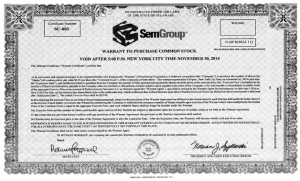The objective of this assignment is to define a technical term that is unknown to some particular audience. The assignment asks for three different types of definitions: a parenthetical definition, a sentence definition, and an expanded definition. The term I have chosen to define is warrant.
Situation:
I am a portfolio manager who manages investment portfolios on behalf of clients. A client of mine calls my office and tells me that a company for which he owns shares in has issued all of their shareholders a warrant for every share that they own. The client tells me that he has only heard of an arrest warrant, or in other words, a legal document that gives the police the ability to arrest someone. My aim is to clarify this distinction, and to define warrant as it relates to financial instruments.

Fig. 1 A stock warrant certificate; the warrant outlines the terms of the issue, in this case, giving the holder the ability to purchase the corporation’s common stock (at a fixed price) before the listed date.
Parenthetical definition
A warrant is a type of financial instrument
Sentence definition
A warrant is a type of financial instrument that gives the holder the right, but not necessarily the obligation, to buy or sell an underlying security (a security is a tradeable financial asset) at a fixed price. The price at which the underlying security can be purchased or sold at is referred to as the exercise price. Warrants are typically issued by corporations and traded on over-the-counter (OTC) exchanges. An OTC exchange is an exchange that is not considered a formal public exchange like the New York Stock exchange or the NASDAQ.
Expanded definition
How does it work?
When an investor receives a warrant from a corporation, they are offered the option to buy or to sell the underlying security at a fixed price. For example, company XYZ issues a warrant that gives the investor the ability to purchase XYZ stock for $10.00 on or before December 31, 2020. The investor is now faced with the option to exercise their right in purchasing XYZ stock at the pre-determined fixed price. If the investor decides to exercise the warrant, or in other words purchase the company’s stock at said price, he must do so before the expiry date of the warrant passes. The proceeds from the transaction are a new source of capital for the issuing corporation.
The different types of warrants:
There are two types of warrants: a call warrant, and a put warrant. A call warrant gives the investor the right to purchase shares of the issuing corporation for a fixed price, which is outlined in the terms of the warrant. A put warrant, on the other hand, gives the investor the right to sell previously owned shares of the issuing corporation. Whether a call or a put warrant, warrants are issued by corporations as a means to raise capital for their business endeavours.
Why might a warrant be exercised?
Consider an investor who holds a call warrant that has an exercise price which is lower than the current market price of the stock. For example, this particular warrant gives the investor the ability to purchase 1 share of common stock for every share currently owned at a price of $10.00. The market price of the stock, however, is trading at $15.00. Seeing as the investor can profit from this difference of $5.00 by buying shares for $10.00 and selling them in the market for $15.00, the warrant will likely be exercised.
Warrants are advantageous for the investor because they give them the option, but not the obligation, of owning more stock in a company. Instead of being forced to add to their current position, they can choose to exercise or not exercise their right to purchase more common shares. Warrants are typically issued when a company has been acquired giving the investor the ability to wait and assess the direction of the company before purchasing more shares.
Sources:
Chen, James. “Warrant.” Investopedia, Investopedia, 2 Mar. 2020, www.investopedia.com/terms/w/warrant.asp.
“FORM OF WARRANT CERTIFICATE.” U.S. Securities and Exchange Commission , www.sec.gov/Archives/edgar/data/1489136/000119312510109336/dex44.htm.
Morah, Chizoba. “Are Stock Warrants Different from Stock Options?” Investopedia, Investopedia, 29 Jan. 2020, www.investopedia.com/ask/answers/08/stock-option-warrant.asp.
Leave a Reply